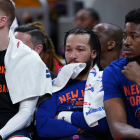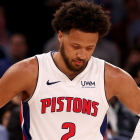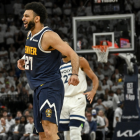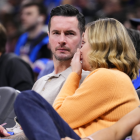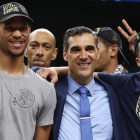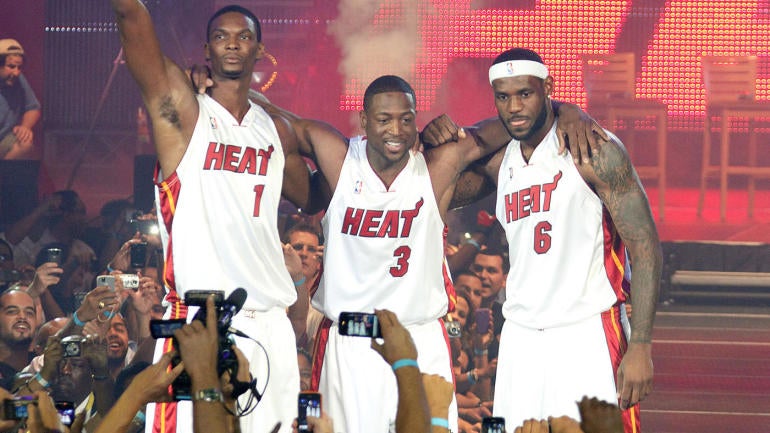
The Miami Heat's 2010 free agency coup represents arguably the greatest NBA offseason that any team has ever had. After clearing their books almost entirely, the Heat signed three star free agents in a single summer: LeBron James, Dwyane Wade and Chris Bosh. The feat was so unprecedented and required such careful planning and execution that the idea of another team pulling it off is nearly unfathomable. Yet according to Brian Windhorst of ESPN, the Chicago Bulls came close.
Wade, according to Windhorst, was the one who pitched the idea to Chicago. He met with his hometown Bulls twice during free agency, and Chicago, initially apprehensive of Wade's intentions, played its first meeting cautiously. By the second meeting, though, the Bulls went all out, and after Wade pitched them on the trio, they looked into how they might create the cap space necessary to land all three superstars. But Wade promised nothing to the Bulls, so they never moved beyond the exploratory stage. Miami had the cap space in hand, and it ultimately won the summer and two championships.
But let's say James, Wade and Bosh had their hearts set on Chicago. How might the Bulls have put together one of the greatest teams in history? Let's turn back the clocks to 2010 in order to find out. All salaries used below are from HoopsHype.
We will assume for the sake of ease that James, Wade and Bosh all sacrifice money in this scenario as they did for the Heat. Using the salaries they actually earned, the trio would have cost the Bulls $43.2 million. The Bulls would have obviously kept Derrick Rose as part of this plan, and he was on the books for $5,546,160 at the time as well, bringing Chicago's total commitment to the four of them up to around $48.75 million. Right away, that means Luol Deng would have to go. His $11.3 million would take Chicago well above the $58 million cap threshold. He would need to be dealt without any money returning to Chicago.
Windhorst mentions the Raptors and Clippers as a destination, but obviously no deal materialized. A third possibility? Another loser in the LeBron derby, the then-New Jersey Nets. Having cleared max cap space to pursue James, the Nets would be more than flexible to absorb Deng's salary, and the players they wound up using that space on were far less valuable than Deng. Jordan Farmar, Travis Outlaw and Johan Petro weren't exactly foundational pieces. Let's say the Bulls offload Deng to the Nets in this scenario, and also find homes for their two other leftover salaries: Hakim Warrick and James Johnson.
Even without Deng, the Bulls have less cap space in this scenario than it appears. While their commitments to their four superstars come in around $9.3 million below the actual line, they actually have far less space than that because of incomplete roster charges. When an NBA team has fewer than 12 players on its roster, from a cap perspective, it takes on the salary of one rookie minimum contract for each empty spot on the roster until it is filled. Say the Bulls were to keep just that foursome. They would also have to account for an extra $3,788,832, or eight incomplete roster charges at the 2010-11 rookie minimum of $473,604. For each player that they add or keep, though, one such charge disappears.
So let's go down the list of players that the Bulls would likely prefer to keep. On top of that list would be Joakim Noah. Fortunately, he was still on his rookie deal at the time and slated to make only $3.128 million. Chicago had more than enough cap space to keep him, though the Bulls would have to contend with his thorny relationship with James. According to Windhorst, Noah called James during free agency, but James never returned that call. He was so good, young and cheap, though, that the Bulls would have found a way to patch up their relationship in the name of winning.
With Noah added, Chicago drops to around $2.85 million in cap space. They could have allocated that space in a number of ways, but the simplest would be to use it on two reserves who proved essential to the Bulls during their 2010-11 season. First, they would be able to keep 2009 first-round pick Taj Gibson at $1,117,680. Second, they would be able to bring on 2008 European second-round pick Omer Asik at $1.7 million. Cross off two more incomplete roster charges, and the Bulls have just under $1 million left to spend, but as any veteran on a minimum deal would cost more than that, they are essentially out of money to play with.
With their cap space spent, Chicago would have no other means of adding free agents beyond veteran's minimum contracts, which, from a cap perspective, equal the two-year minimum for any player with that much experience or more (though the players make more in cash). The Bulls would not have had access to the Mid-Level Exception because at that point, the variant given to teams with cap space did not exist, and they would not have access to the Bi-Annual Exception, as they used it during the 2009-10 season on Jannero Pargo.
The Bulls would, therefore, have the following roster:
LeBron James | $14,500,000 |
Chris Bosh | $14,500,000 |
Dwyane Wade | $14,200,000 |
Derrick Rose | $5,546,160 |
Joakim Noah | $3,128,536 |
Omer Asik | $1,721,000 |
Taj Gibson | $1,117,680 |
Veteran's minimum signings (8) | $6,835,112 |
Total | $61,548,488 |
There are slight variants here that might be slightly more favorable to the Bulls. Perhaps they could have convinced Asik to take a bit less, for instance, so that they could make use of that final sliver of cap space. They'd need some shooting, and in reality, they added Keith Bogans as their starting shooting guard for only $1.6 million. With such a star-studded roster, they may have been able to recruit him for less. Those kinds of players, veterans who could shoot, as well as the older ring-chasers Miami actually pursued, would be the likely targets for Chicago's final few roster spots. They also received a trade exception for dealing Kirk Hinrich into Washington's cap space, but as they did not use it to add major salary in reality, we will assume the Bulls don't use it for anything drastic here (though it could be argued that the presence of three more stars would have forced their hand).
Despite lacking the shooting Miami prioritized in adding Mike Miller and keeping Mario Chalmers, the talent of such a Chicago roster would have been overwhelming. It's one of the greatest what if's in NBA history. The Bulls could have had a starting lineup with two MVPs, two Finals MVPs and five All-Stars. But as he so often has, Pat Riley stepped in and broke their hearts.














